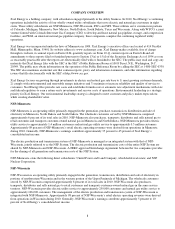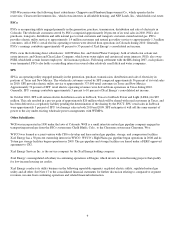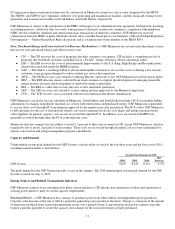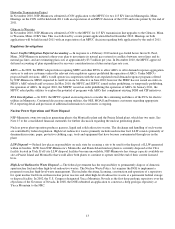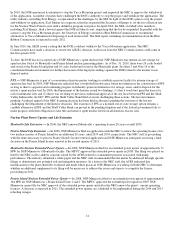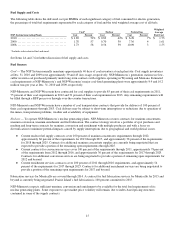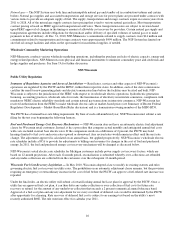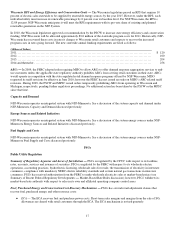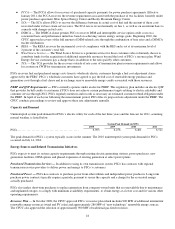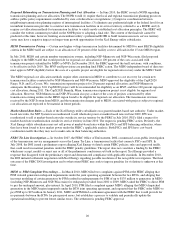Xcel Energy 2010 Annual Report Download - page 26
Download and view the complete annual report
Please find page 26 of the 2010 Xcel Energy annual report below. You can navigate through the pages in the report by either clicking on the pages listed below, or by using the keyword search tool below to find specific information within the annual report.16
Natural gas — The NSP System uses both firm and interruptible natural gas and standby oil in combustion turbines and certain
boilers. Natural gas supplies and associated transportation and storage services for power plants are procured under contracts with
various terms to provide an adequate supply of fuel. The supply, transportation and storage contracts expire in various years from
2011 to 2028. All of the natural gas supply contracts have pricing that is tied to various natural gas indices. Most transportation
contract pricing is based on FERC approved transportation tariff rates. These transportation rates are subject to revision based
upon FERC approval of changes in the timing or amount of allowable cost recovery by providers. Certain natural gas supply and
transportation agreements include obligations for the purchase and/or delivery of specified volumes of natural gas or to make
payments in lieu of delivery. At Dec. 31, 2010, NSP-Minnesota’s commitments related to supply contracts were $14 million and
commitments related to transportation and storage contracts were approximately $499 million. The NSP System has limited on-
site fuel oil storage facilities and relies on the spot market for incremental supplies, if needed.
Wholesale Commodity Marketing Operations
NSP-Minnesota conducts various wholesale marketing operations, including the purchase and sale of electric capacity, energy and
energy related products. NSP-Minnesota uses physical and financial instruments to minimize commodity price and credit risk and
hedge supplies and purchases. See Item 7A for further discussion.
NSP-Wisconsin
Public Utility Regulation
Summary of Regulatory Agencies and Areas of Jurisdiction — Retail rates, services and other aspects of NSP-Wisconsin’s
operations are regulated by the PSCW and the MPSC, within their respective states. In addition, each of the state commissions
certifies the need for new generating plants and electric transmission lines before the facilities may be sited and built. NSP-
Wisconsin is subject to the jurisdiction of the FERC with respect to its wholesale electric operations, hydroelectric generation
licensing, accounting practices, wholesale sales for resale, the transmission of electricity in interstate commerce, compliance with
mandatory NERC electric reliability standards and certain natural gas transactions in interstate commerce. NSP-Wisconsin has
received authorization from the FERC to make wholesale electric sales at market-based prices (see Summary of Recent Federal
Regulatory Developments - Market-Based Rate Rules discussion) and is a transmission-owning member of the MISO RTO.
The PSCW has a biennial base-rate filing requirement. By June of each odd-numbered year, NSP-Wisconsin must submit a rate
filing for the test year beginning the following January.
Fuel and Purchased Energy Cost Recovery Mechanisms — NSP-Wisconsin does not have an automatic electric fuel adjustment
clause for Wisconsin retail customers. Instead, it has a procedure that compares actual monthly and anticipated annual fuel costs
with costs included in retail base electric rates. If the comparison results in a difference of 2 percent, the PSCW may hold
hearings limited to fuel costs and revise rates upward or downward. Any revised rates would remain in effect until the next rate
change. The adjustment approved is calculated on an annual basis, but applied prospectively. NSP-Wisconsin’s wholesale electric
rate schedules include a FCA to provide for adjustments to billings and revenues for changes in the cost of fuel and purchased
energy. In 2011, the fuel and purchased energy cost recovery mechanism will be changed as discussed below.
NSP-Wisconsin’s retail electric rate schedules for Michigan customers include power supply cost recovery factors, which are
based on 12-month projections. After each 12-month period, reconciliation is submitted whereby over-collections are refunded
and any under-collections are collected from the customers over the subsequent 12-month period.
Wisconsin Fuel Cost Recovery Legislation — In May 2010, Wisconsin adopted a law to modify its existing statutes and rules
governing electric fuel cost recovery in utility rates. The prohibition on an automatic adjustment clause remains, but the provision
requiring an emergency or extraordinary increase in the cost of fuel before the PSCW can approve a fuel-related rate increase was
repealed.
Under the final rules, an electric utility will submit a forward-looking annual fuel cost plan for approval by the PSCW. Once a
utility has an approved fuel cost plan, it can then defer any under-collection or over-collection of fuel costs for future rate
recovery or refund, for the amount of any under/over-collection that exceeds a 2 percent symmetrical annual tolerance band.
Approval of a fuel cost plan and any rate adjustment for recovery or refund of deferred costs would be determined by the PSCW
after opportunity for a hearing. Rate recovery of deferred fuel cost is subject to an earnings test based on the utility’s most
recently authorized ROE. The rule went into effect for calendar year 2011.




